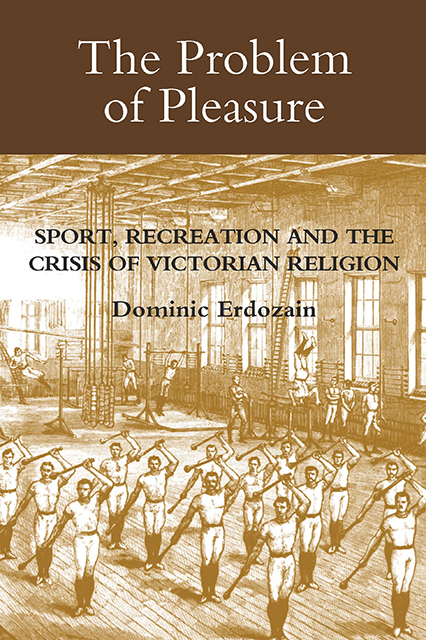Book contents
- Frontmatter
- Contents
- List of Illustrations
- Acknowledgements
- Abbreviations and Note on Conventions
- Introduction
- 1 ‘Born Free and Everywhere in Chains’: Evangelicalism and the Problem of Pleasure
- 2 Romanticism With Boots on: The Virtues of Sport
- 3 Renegotiating the Secular: The Coming of Recreation to the Mid-Victorian Religious World
- 4 ‘We are all Cyclists Now’: Applying the Pleasure Principle
- 5 Sport and the Secularisation of Late-Victorian Youth Ministry
- 6 Contesting the Sacred: The Late-Victorian Church and the ‘Gospel of Amusement’
- Conclusion
- Bibliography
- Index
1 - ‘Born Free and Everywhere in Chains’: Evangelicalism and the Problem of Pleasure
Published online by Cambridge University Press: 02 March 2023
- Frontmatter
- Contents
- List of Illustrations
- Acknowledgements
- Abbreviations and Note on Conventions
- Introduction
- 1 ‘Born Free and Everywhere in Chains’: Evangelicalism and the Problem of Pleasure
- 2 Romanticism With Boots on: The Virtues of Sport
- 3 Renegotiating the Secular: The Coming of Recreation to the Mid-Victorian Religious World
- 4 ‘We are all Cyclists Now’: Applying the Pleasure Principle
- 5 Sport and the Secularisation of Late-Victorian Youth Ministry
- 6 Contesting the Sacred: The Late-Victorian Church and the ‘Gospel of Amusement’
- Conclusion
- Bibliography
- Index
Summary
The evangelical movement, while not a model of order and consistency, was a miracle of energy and zeal. It contained contradictions; it was frequently oppressive; but it injected a vigour into British Christianity unknown since the Civil War. Isaac Watts went further in his assessment. When news reached him in 1736 of a revival in Northampton, Massachusetts under a then-unknown Jonathan Edwards, he wrote feverishly to a friend: ‘We have not heard anything like it since the Reformation, nor perhaps since the days of the apostles.’ Watts’ excitement was justified by the surge of revivals that followed the stirring in New England. He, and Edwards for that matter, inhabited a spiritual world that was measured, staid and increasingly introspective. They now witnessed an urgency that would propel Christianity into its most expansive phase in history. Edwards was no firebrand, and he laboured to moderate the emotional excesses of this ‘Great Awakening’, but there was a dynamism here that respected neither person nor protocol. It was personified in the mesmeric figure of George Whitefield, a young clergyman whose ability to engage thousands on the necessity of the ‘new birth’ was enough to convince Edwards that God really was at work. Strangest of all, he was apparently choosing the foolish things of this world to shame the wise: the light was coming from the Church of England.
Whitefield was involved in revivals on both sides of the Atlantic, and there were stirrings in Wales and Scotland, stimulated by news from New England. But it was when an earnest and rather labouring clergyman, John Wesley, felt his ‘heart strangely warmed’ in 1738 that a movement got underway. The message that anyone could know and feel salvation was electrifying. Within days of experiencing this new level of certainty, Wesley and his followers were preaching to large crowds in open spaces – symbolically separated from the churches. By the end of the century, however, the established churches and the older dissenters had been touched by the spiritual contagion. A revival became a revolution – hungry for popular affections and destructive of political aspirations, if its critics are to be believed. In 1780 Hannah More's publisher had told her that she was ‘too good a Christian for an author’.
- Type
- Chapter
- Information
- The Problem of PleasureSport, Recreation and the Crisis of Victorian Religion, pp. 41 - 84Publisher: Boydell & BrewerPrint publication year: 2010



